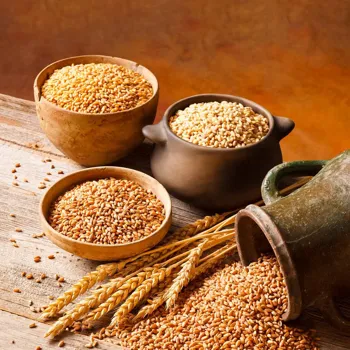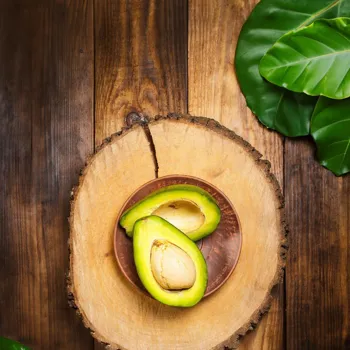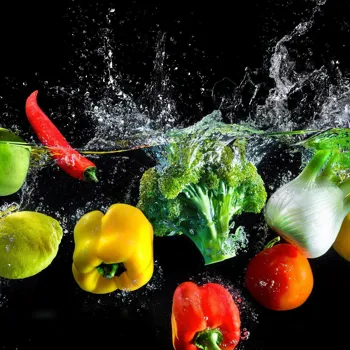Unveiling The Power of a Balanced Diet: Vital Components for Wellness. Dive into the key elements for a healthier life
In the bustling life of India, where the aroma of spices fills the air and the streets
throb with activity, it's easy to overlook a crucial aspect of our well-being: a balanced diet.
We are what we eat, as they say, and a diet rich in the right nutrients is the bedrock of a healthy and fulfilling life. A balanced diet isn't about restrictive eating or bland meals.
It's all about incorporating a variety of foods that provide our bodies with the essential nutrients needed to function optimally. This article explores the seven key components of a balanced diet and explains how they contribute to our overall health, vitality, and happiness.
Carbohydrates: The Body's Primary Fuel
Carbohydrates often get a bad rap, but they are the body's primary source of energy. They fuel our muscles, brain, and nervous system, allowing us to perform our daily tasks with vigour and focus. However, the type of carbohydrates we consume matters.

Simple carbohydrates, found in sugary drinks and processed foods, provide a quick burst of energy followed by a crash.
Complex carbohydrates, on the other hand, found in whole grains like wheat, brown rice, oats, and millets, offer a sustained release of energy, keeping us feeling full and energized for longer. These are also rich in fibre, which aids digestion and helps regulate blood sugar levels.
Incorporating foods like roti, dalia, upma (made with oats or semolina), and poha into your regular meals is a great way to ensure you're getting your daily dose of complex carbohydrates. Remember to choose whole grains over refined ones whenever possible for maximum health benefits.
Proteins: The Building Blocks of Life
Proteins are the essential building blocks of our body, responsible for repairing and maintaining tissues, producing enzymes and hormones, and supporting a healthy immune system. They are crucial for growth and development, especially in children and adolescents.
Good sources of protein in a vegetarian diet include lentils (dal), chickpeas (chana), kidney beans (rajma), tofu, paneer (Indian cheese), and nuts and seeds. Ensure you include a variety of these protein-rich foods in your diet to meet your daily requirements.
Remember, protein is not just for bodybuilders; it's essential for everyone, regardless of age or activity level. Include a portion of dal with every meal, snack on nuts and seeds throughout the day, and explore the versatility of tofu and paneer in your cooking to reap the benefits of protein.
Fats: Essential for Hormone Production and Nutrient Absorption
Fats are often misunderstood, but they are a crucial part of a balanced diet. They are essential for hormone production, nutrient absorption, and cell function.

Healthy fats, such as those found in nuts, seeds, avocados, and olive oil, can actually lower cholesterol levels and reduce the risk of heart disease. Avoid trans fats, which are found in processed foods and fried snacks, as they can raise cholesterol levels and increase the risk of heart problems.
Incorporate a handful of almonds or walnuts into your daily routine, use olive oil for cooking, and enjoy the creamy texture of avocado in salads. Remember, moderation is key; even healthy fats should be consumed in appropriate amounts.
Vitamins: The Tiny Powerhouses
Vitamins are essential micronutrients that play a vital role in numerous bodily functions. They support immune function, energy production, and cell growth.
Different vitamins are found in different foods, so it's important to eat a variety of fruits and vegetables to get a full spectrum of vitamins.
For example, vitamin C is abundant in citrus fruits like oranges and lemons, vitamin A is found in carrots and sweet potatoes, and vitamin D is produced by the body when exposed to sunlight.
Be sure to include a rainbow of colourful fruits and vegetables in your diet to ensure you're getting all the vitamins you need. Seasonal fruits and vegetables are often the most nutritious and affordable options.
Minerals: Maintaining Balance and Function
Minerals, like vitamins, are essential for various bodily functions. They help maintain fluid balance, build strong bones, and regulate nerve function. Important minerals include calcium, iron, potassium, and zinc.
Calcium is found in dairy products and leafy green vegetables, iron is found in lentils and spinach, potassium is found in bananas and sweet potatoes, and zinc is found in nuts and seeds.
A deficiency in any of these minerals can lead to health problems, so it's important to ensure you're getting enough through your diet. Incorporate a variety of mineral-rich foods into your daily meals to support optimal health.
Fiber: Promoting Digestive Health
Fiber is a type of carbohydrate that the body cannot digest. However, it plays a crucial role in digestive health. It adds bulk to stool, making it easier to pass and preventing constipation. Fiber also helps lower cholesterol levels and regulate blood sugar levels.
Good sources of fiber include whole grains, fruits, vegetables, and legumes. Aim for at least 25-30 grams of fiber per day. Start your day with a bowl of oats, include plenty of fruits and vegetables in your meals, and snack on nuts and seeds throughout the day to increase your fiber intake.
Drinking plenty of water is also important when increasing fiber consumption.
Water: The Elixir of Life
Water is essential for life. It makes up about 60% of our body weight and is involved in nearly every bodily function. Water helps regulate body temperature, transport nutrients, and remove waste products. Dehydration can lead to fatigue, headaches, and constipation.

Aim to drink at least 8 glasses of water per day. You can also get water from fruits and vegetables like watermelon and cucumber. Carry a water bottle with you throughout the day and sip on it regularly. Staying hydrated is crucial for maintaining optimal health and well-being.



















